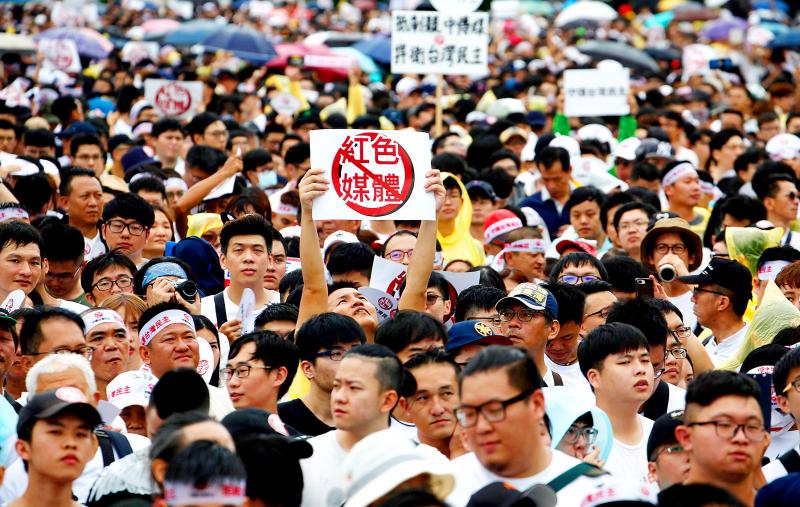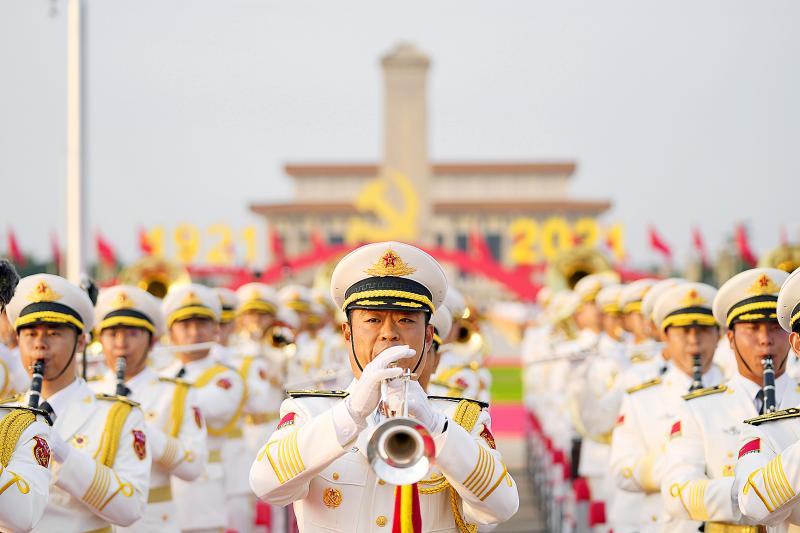The comment arrived shortly after I’d posted the link on Facebook. The article, which was my first for Taiwan Business TOPICS, the magazine of the American Chamber of Commerce in Taiwan, was about burgeoning trade between Taiwan and Lithuania. Accompanied by the profile picture of an attractive young woman, the remark read: “Hello. Can we be friends? It’s like a fate to meet here.”
It was all so obvious. My article, while not directly critical of China, had drawn attention to Beijing’s ban on Lithuanian imports. This came after the opening of a Taiwan representative office in Vilnius in November under the name “Taiwan,” and a visit to Taipei by the Lithuanian Parliamentary Group that same month.
Multiple Lithuanian MPs had spoken out against Beijing’s bullying behavior — most vociferously Matas Maldeikis, who led the November delegation. Among other barbs, Maldeikis branded China “the people’s Republic of Comedy” for its hissy-fit.

Photo: AFP
While Beijing had denied issuing directives on Lithuanian imports, the Lithuanian officials I had interviewed for the piece were unequivocal.
“The Chinese authorities are denying any problems, but this is silly because our companies have plenty of evidence collected in a file and being sent to the WTO,” said Antanas Venckus, head of the Lithuanian Ministry of Agriculture’s International Affairs and Export Promotion Department. “China also threatens international companies that buy Lithuanian components. We can live without the Chinese market but not without being part of the global supply chain.”
None of this had featured in the piece, which was for a business-focused publication that avoids political controversy. Aside from two references to the events that had infuriated China — to explain the context of warming ties between Taipei and Vilnius — there was no focus on Beijing’s actions. Venckus had called the Chinese Communist Party’s (CCP) behavior “incompatible with any international rules or trade laws,” but — though I would have liked to — I hadn’t gone there.

Photo: AP
Bland as it had been, the bait attracted the wumao (五毛) — the CPP-aligned Internet commentators, often called “the 50-cent army,” paid to troll or derail on-line discussions. It wasn’t hard to flush “her” out. A simple question about what she thought of the article and friendly overtures turned into invective: Lithuania was a flea that China could crush. It should watch out.
The lovely woman then peppered several other personal posts with abuse before slithering off.
SOFT SKILLS
Predictable as it may have seemed, I was surprised. Almost 20 years after I’d first encountered the wumao footsoldiers, they hadn’t discernibly upped their game. Aside from language issues, the failure to tap into Western sensibilities stood out. The bravado about tiny, weak countries meaning nothing to huge, powerful China was as embarrassingly tone deaf as ever.
“This is where those soft skills come into play,” says Marcin Jerzewski, an analyst at the Taipei office of the European Values Center. “Because it doesn’t matter if you can talk about Lithuania being a pathetic little flea that you can squash in flawless English, if you don’t understand that the other side will not receive the message well.”
With disinformation on Russia’s war in Ukraine rife on social media, and ample evidence of cooperation on this between Beijing and Moscow, something occurred to me: Russian trolls and propagandists appear far more sophisticated and, thus, successful in engaging Western audiences.
Is this a cultural thing? A remnant of Russian Cold War infiltration into Western governments, societies and mindsets?
“I wouldn’t say Russian trolling is less obvious, but it’s way more insidious,” says Gil Grundy, a long-time China watcher who blogs as Fear of a Red Planet. “They know the right buttons to push to make at least a small portion of their audience agree or sympathize.”
ALTERNATE REALITY
Anyone monitoring Russian narratives circulating on English-language social media — NATO and EU provocation, Ukrainian Nazis, US-funded biolabs — knows the portion Grundy alludes to. These are, as Ukrainian journalist Ivan Verstyuk told me, “extremists, people looking for alternative worldviews and youngish people who have nothing to do.”
In comparison, Grundy says, Chinese external propaganda is easier to handle.
“China isn’t recruiting so much or hitting up random fringe groups — far-right, far-left, anti-vax, environmentalists and hyper pro-remain or leave [the European Union] types,” he says.
For other observers, China’s bid to enlist foreign voices takes a different form.
“China still operates on the alternate reality version of propaganda,” says Matthew Tye, better known as YouTuber LaoWhy86. “It shuts down voices, blocks all truthful media and shoots, edits and brands its own version of reality.”
In contrast, Tye says, Russia permits a degree of reality in its media, “but slides in doubt, and plays off chaos” to distract people and make them apathetic. However, Tye sees signs that Beijing is adopting Moscow’s playbook; and while methods might diverge, the principles are similar.
“Russia is still much more advanced than China [in reaching foreign audiences], but China has learned that to make people believe what you’re peddling, you have to make it believable,” Tye says. “So, they employ Westerners to do the nuanced propaganda efforts across social media platforms.”
TAXONOMY OF INFLUENCERS
Having spotlighted the dire human rights situation in China under President Xi Jinping (習近平), Tye has piqued the ire of authorities in Beijing, who have veered between disparaging him and attempting to sign him up. The former tactic often comes via China-based social media personalities Tye has outed, all of whom are either directly on the CCP payroll or working through “agencies.”
At Miburo, a consultancy that specializes in countering malign info-ops, a “taxonomy” of the main types of influencers has been developed. These vary in the overtness of their connections to Chinese state media.
“While China is still not as good as Russia at things like covert messaging in foreign languages, they have been pouring more resources and effort into on-line info ops every year since 2019,” says Nick Monaco, Miburo’s director of China research.
Monaco says Beijing has become innovative in disguising its messages through these paid shills.
“Some are Chinese and fluent in local languages for their target regions, others are foreign and enticed to spread CCP-aligned messaging through a variety of incentives, including money, free travel and features on state media.”
For David Bandurski, China’s relative lack of refinement is partly explained by its rigid domestic media culture.
“It is certainly true that much external propaganda often lacks sophistication in the sense that it simply translates into foreign languages the official content and talking points from the Party-state media,” says Bandurski, co-director of the China Media Project, a research program in partnership with the Journalism & Media Studies Center at the University of Hong Kong. “Political rhetoric is a part of the air people breathe, so it’s a challenge to think about foreign audiences when the only audience much of the time is the Party boss.”
DIVERGING GOALS
For this reason, one might conclude that Russian propaganda on social media networks is more effective, “because it is less overtly ideological and, in a sense, more flexible.”
However, Bandurski guards against this assumption, noting that it is difficult to gauge how Chinese messaging is received, especially in developing countries. Pointing to deals with outlets around the world that offer free content from Chinese state media, he also highlights “constant experimentation in viral and even entertaining content, and in new forms of delivery.”
As an example, he cites Journey of Warriors, a Chinese survival series which aired on the Discovery Channel late last year, “reaching tens of millions of viewers.”
At first sight, the show looks like regular reality TV, but closer inspection reveals the tell-tale signs of CCP propaganda. The series, which recreates the Red Army’s Long March of 1934-1935, was praised at a Chinese awards ceremony for “perfectly integrating stories of revolutionary history with the international communication discourse system in a way that foreigners find easy to understand and accept.”
For some analysts, arguments over the relative caliber of different state-sponsored propaganda programs are missing the point.
“Sure, Russian disinformation is more sophisticated than Chinese,” says David Patrikarakos, author of War in 140 Characters, a book that posits the rise of “homo digitalis,” a new breed of cyber warriors. “But it’s still very much: You throw everything at the wall, and if 10 percent sticks, you’ve got a win. You’re not dealing with geniuses here.”
What the Chinese have, says Patrikarakos, is “mass,” and this helps dictate their disinformation strategy.
“If the goal is to convince people of the rightness of their cause, the stuff they’re doing is pointless. But if it’s to swarm you, intimidate you and just be such a pain in the arse that you stop writing or you don’t read that stuff, then it’s effective.”

Sept.16 to Sept. 22 The “anti-communist train” with then-president Chiang Kai-shek’s (蔣介石) face plastered on the engine puffed along the “sugar railway” (糖業鐵路) in May 1955, drawing enthusiastic crowds at 103 stops covering nearly 1,200km. An estimated 1.58 million spectators were treated to propaganda films, plays and received free sugar products. By this time, the state-run Taiwan Sugar Corporation (台糖, Taisugar) had managed to connect the previously separate east-west lines established by Japanese-era sugar factories, allowing the anti-communist train to travel easily from Taichung to Pingtung’s Donggang Township (東港). Last Sunday’s feature (Taiwan in Time: The sugar express) covered the inauguration of the

The corruption cases surrounding former Taipei Mayor and Taiwan People’s Party (TPP) head Ko Wen-je (柯文哲) are just one item in the endless cycle of noise and fuss obscuring Taiwan’s deep and urgent structural and social problems. Even the case itself, as James Baron observed in an excellent piece at the Diplomat last week, is only one manifestation of the greater problem of deep-rooted corruption in land development. Last week the government announced a program to permit 25,000 foreign university students, primarily from the Philippines, Indonesia and Malaysia, to work in Taiwan after graduation for 2-4 years. That number is a

This year’s Michelin Gourmand Bib sported 16 new entries in the 126-strong Taiwan directory. The fight for the best braised pork rice and the crispiest scallion pancake painstakingly continued, but what stood out in the lineup this year? Pang Taqueria (胖塔可利亞); Taiwan’s first Michelin-recommended Mexican restaurant. Chef Charles Chen (陳治宇) is a self-confessed Americophile, earning his chef whites at a fine-dining Latin-American fusion restaurant. But what makes this Xinyi (信義) spot stand head and shoulders above Taipei’s existing Mexican offerings? The authenticity. The produce. The care. AUTHENTIC EATS In my time on the island, I have caved too many times to

In the aftermath of the 2020 general elections the Chinese Nationalist Party (KMT) was demoralized. The Democratic Progressive Party (DPP) had crushed them in a second landslide in a row, with their presidential candidate Tsai Ing-wen (蔡英文) winning more votes than any in Taiwan’s history. The KMT did pick up three legislative seats, but the DPP retained an outright majority. To take responsibility for that catastrophic loss, as is customary, party chairman Wu Den-yih (吳敦義) resigned. This would mark the end of an era of how the party operated and the beginning of a new effort at reform, first under